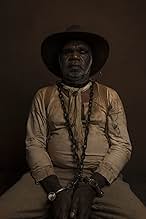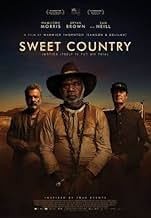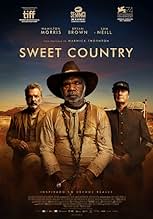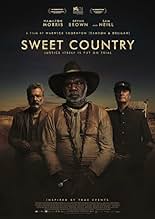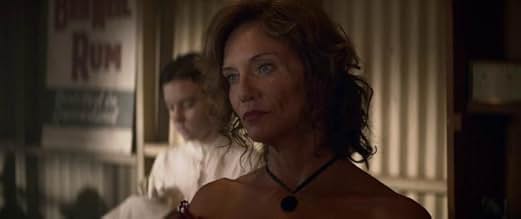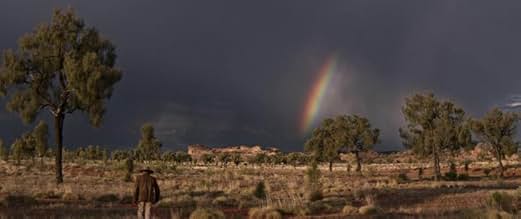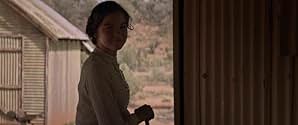VALUTAZIONE IMDb
6,9/10
9739
LA TUA VALUTAZIONE
Sulla frontiera del Territorio del Nord negli anni '20, la giustizia stessa viene processata quando un anziano contadino aborigeno spara a un uomo bianco per autodifesa e va in fuga mentre u... Leggi tuttoSulla frontiera del Territorio del Nord negli anni '20, la giustizia stessa viene processata quando un anziano contadino aborigeno spara a un uomo bianco per autodifesa e va in fuga mentre una banda si riunisce per dargli la caccia.Sulla frontiera del Territorio del Nord negli anni '20, la giustizia stessa viene processata quando un anziano contadino aborigeno spara a un uomo bianco per autodifesa e va in fuga mentre una banda si riunisce per dargli la caccia.
- Regia
- Sceneggiatura
- Star
- Premi
- 22 vittorie e 29 candidature totali
Natassia Gorey Furber
- Lizzie
- (as Natassia Gorey-Furber)
Luka Magdeline Cole
- Olive
- (as Luka May Glynn-Cole)
Lachlan J. Modrzynski
- Constable Campbell
- (as Lachlan Modrzynski)
Recensioni in evidenza
I've read here two reviews by Australians, one hated the film, the other loved it. I've seen the film in the company of two other Australians, they both loved it.
Yes, I agree to the point made, by the hating reviewer: the movie does judge the past according to modern morals and sensibilities. But this would be a valid point if we were discussing an academic paper or a movie that was made back then. This is neither it's a movie about Australian past that was made at the present and it feels so true it hurts. It hurts because the only way we can see it is with our modern eyes. Saying people thought differently back then, is true but it's beside the point. We, the viewers are here and now and that's the only time and place we can watch it.
So lets speak about other aspects of the film: cinematography, acting and story telling are superb. But I liked most of all the editing, with these tiny flashes forward and backward throughout the movie, flashes we can fully understand only when we've seen the movie all the way through. Please do, I think you won't regret it.
So lets speak about other aspects of the film: cinematography, acting and story telling are superb. But I liked most of all the editing, with these tiny flashes forward and backward throughout the movie, flashes we can fully understand only when we've seen the movie all the way through. Please do, I think you won't regret it.
Using the Hollywood label 'western' for an Australian outback drama casts an odd cultural shadow over the achievements of Sweet Country (2017). At a Q & A preview in Sydney, director Warwick Thornton told the audience "people think in boxes so we need to call it something". However, 'western' is an awkward box for an Australian tale of such contemporary relevance and cinematic beauty.
Set in 1920s outback Northern Territory, the narrative is deceptively simple. Indigenous farm hand Sam Kelly (Hamilton Morris) and his wife are lucky to work for god-fearing landowner Fred Smith (Sam Neill) who believes that all are created equal. Fred allows Sam to help his unstable war-veteran neighbour Harry March (Ewan Leslie) for a few days but it sours quickly and Sam kills Harry in self-defence. The rest of the story tracks the hunt led by Sergeant Fletcher (Bryan Brown) through treacherous country that is home for Sam. Eventually white man's justice must be faced.
This is an outstanding film for many reasons. In terms of visual impact, it is stunning. The cinematography shows a deep love of country with majestic panoramas that dwarf humans. Rich red colour palettes evoke the hot, dry, heartland of an ancient land. The camera tracks seamlessly from wide-screen images to small details like a balletic sand scorpion or a cold hard bullet being loaded into a chamber. Scene after scene, we find symbols of the conflicted relationship between white man and nature; there are no words more jarring than to hear Indigenous people being referred to as "black stock".
In terms of aural impact, silence has never been so beautiful. It takes some time into the film before we notice there is no musical score, and none is needed. As Thornton put it, when you stand in the desert there are no orchestral violins to tell you what to feel. Silence conveys the outback. You hear the rustle of leaves in the wind, the sound of a flowing river, horses' hooves pounding the ground, and most confronting: the sound of a heavy chain being dragged across desert sand, manacled to the black hand of a fleeing Indigenous youth.
The casting is excellent. Bryan Brown and Sam Neill are almost cameo performers in their roles as hard-core outback characters. The emotional centre of the film, however, is Hamilton Morris. He speaks little and emotes even less. His face is a wide, impassive, deeply etched, and painful canvas that speaks of Indigenous people's dispossession and barbaric mistreatment by armed invaders. Views will differ over whether the Johnny Cash cowboy ballad during the credits makes this more or less of an Australian story. This powerful but disturbing film reminds Australians of our history and need to reconcile with the past.
Set in 1920s outback Northern Territory, the narrative is deceptively simple. Indigenous farm hand Sam Kelly (Hamilton Morris) and his wife are lucky to work for god-fearing landowner Fred Smith (Sam Neill) who believes that all are created equal. Fred allows Sam to help his unstable war-veteran neighbour Harry March (Ewan Leslie) for a few days but it sours quickly and Sam kills Harry in self-defence. The rest of the story tracks the hunt led by Sergeant Fletcher (Bryan Brown) through treacherous country that is home for Sam. Eventually white man's justice must be faced.
This is an outstanding film for many reasons. In terms of visual impact, it is stunning. The cinematography shows a deep love of country with majestic panoramas that dwarf humans. Rich red colour palettes evoke the hot, dry, heartland of an ancient land. The camera tracks seamlessly from wide-screen images to small details like a balletic sand scorpion or a cold hard bullet being loaded into a chamber. Scene after scene, we find symbols of the conflicted relationship between white man and nature; there are no words more jarring than to hear Indigenous people being referred to as "black stock".
In terms of aural impact, silence has never been so beautiful. It takes some time into the film before we notice there is no musical score, and none is needed. As Thornton put it, when you stand in the desert there are no orchestral violins to tell you what to feel. Silence conveys the outback. You hear the rustle of leaves in the wind, the sound of a flowing river, horses' hooves pounding the ground, and most confronting: the sound of a heavy chain being dragged across desert sand, manacled to the black hand of a fleeing Indigenous youth.
The casting is excellent. Bryan Brown and Sam Neill are almost cameo performers in their roles as hard-core outback characters. The emotional centre of the film, however, is Hamilton Morris. He speaks little and emotes even less. His face is a wide, impassive, deeply etched, and painful canvas that speaks of Indigenous people's dispossession and barbaric mistreatment by armed invaders. Views will differ over whether the Johnny Cash cowboy ballad during the credits makes this more or less of an Australian story. This powerful but disturbing film reminds Australians of our history and need to reconcile with the past.
This movie is an absolute masterpiece of Australian cinema. The way it tells the story is nothing short of amazing. The Cinemaphotography is a joy to take in, it really shows the Australian outback in all of its glory. This film is a must see for anyone looking for a film that will impact your life in a very real way. This is real cinema in all of its glory
In the ever widening divide between colour, cast and creed, director Warwick Thornton takes the traditional setting of a frontier western and builds the foundation for a brutal and angry discourse on racism and savagery. But unlike a typical Hollywood western, the savages here are not the indigenous people who fight for the preservation of their ancestral land-dwelling. Set in 1920s Australia, and just a few decades after independence, Sweet Country seeks to echo the haunting wails of the founding fathers of modern Australia.
Both haunting and tragic, the film is politically provocative and poetically proverbial in narrating a dark era when Australia's justice system was still in its infancy. On the run for killing a cruel white settler, Aboriginal Sam (Hamilton Morris) and his wife have little chance of escaping the law, especially during a time when lawmakers were the laugh of the town. It doesn't help either that a frontier soldier (played by Bryan Brown) is out for blood as a self- proclaimed lawman. Sam's only aid is his charitable employer and preacher Fred (Sam Neil). But there's something about the whole incident that Sam and his wife have kept to themselves and the only way for any sliver of redemption is to get caught.
Although deliberately paced (the very first scene is a symbolic pot on the boil), the final showdown is suspenseful but also gut- wrenching and ultimately heartbreaking. An Aboriginal himself, Thornton (who is also the cinematographer) uses gorgeous vistas of the Australian landscape to juxtapose the ugly nature of this story with the sheer beauty of his land. And amongst all this beauty there is suffering, trauma, barbaric colonialism, and absolute disregard for human life. As impressive as the visuals is Thornton's meticulously composed storytelling and it's a power structure with imposing breath, width and emotional depth.
Both haunting and tragic, the film is politically provocative and poetically proverbial in narrating a dark era when Australia's justice system was still in its infancy. On the run for killing a cruel white settler, Aboriginal Sam (Hamilton Morris) and his wife have little chance of escaping the law, especially during a time when lawmakers were the laugh of the town. It doesn't help either that a frontier soldier (played by Bryan Brown) is out for blood as a self- proclaimed lawman. Sam's only aid is his charitable employer and preacher Fred (Sam Neil). But there's something about the whole incident that Sam and his wife have kept to themselves and the only way for any sliver of redemption is to get caught.
Although deliberately paced (the very first scene is a symbolic pot on the boil), the final showdown is suspenseful but also gut- wrenching and ultimately heartbreaking. An Aboriginal himself, Thornton (who is also the cinematographer) uses gorgeous vistas of the Australian landscape to juxtapose the ugly nature of this story with the sheer beauty of his land. And amongst all this beauty there is suffering, trauma, barbaric colonialism, and absolute disregard for human life. As impressive as the visuals is Thornton's meticulously composed storytelling and it's a power structure with imposing breath, width and emotional depth.
The movie has a familiar story and simple dialogue, and this is not a problem by any means, yet it's technically impressive. Sweet Country is a visually stunning film. The cinematography in this movie is similar to Mudbound's, but it's even more beautiful! Actually, it has the best cinematography of the year, so far! And while the movie looks poetic, the same goes for the storytelling. It reminded me of Days of Heaven. As a matter of fact, you may feel if you're watching a Terrence Malick film, except it's more fast-paced.
The similarity between Sweet Country and Malick's movies don't stop there. As Warwick Thornton used symbolism in Sweet Country in a way that resembles Malick's use of symbolism. By that I mean the use of allegories and symbols in a beautiful way that feels literary or poetic. Unfortunately, the use of symbols in Sweet Country often feels superfluous, and completely unnecessary.
Sweet Country is masterly edited, and I think that what makes it very watchable, and often enjoyable despite its poetic style that may indispose some people.
Thornton used intercut flash-forwards and flashbacks heavily. And while sometimes they help us understanding some events that happened, or will happen, therefore build tension, they often seem like nothing but artistic frippery, specially when they are used to make the movie seem if it has a non-linear storytelling.
Sweet Country also should be praised for its non-sentimental approach to its message. Unlike other movies that tackle the same subject matter, Sweet Country doesn't dramatize any aspect of its story. The movie even doesn't have a soundtrack, and that makes it feel more realistic. The movie relies on its bleak and dreary atmosphere to imply its subject matter and moral instead of presenting them in the usual manner.
All the performances are good. Hamilton Morris' performance is impressive because it feels genuine. Sam Neill is also very good even if his character, Fred Smith, is underdeveloped. Fred Smith is a very important character and should have been more developed, but unfortunately, it's a very flat character.
In general, the movie has some issues in terms of its characters. The movie has too many characters for its own good. And the movie tries to give almost every character its fair share of importance.
In the end, Sweet Country a movie of visuals first and foremost, it could hardly be more visually impressive. But, to be honest, it's a very pretentious work.
(7/10)
The similarity between Sweet Country and Malick's movies don't stop there. As Warwick Thornton used symbolism in Sweet Country in a way that resembles Malick's use of symbolism. By that I mean the use of allegories and symbols in a beautiful way that feels literary or poetic. Unfortunately, the use of symbols in Sweet Country often feels superfluous, and completely unnecessary.
Sweet Country is masterly edited, and I think that what makes it very watchable, and often enjoyable despite its poetic style that may indispose some people.
Thornton used intercut flash-forwards and flashbacks heavily. And while sometimes they help us understanding some events that happened, or will happen, therefore build tension, they often seem like nothing but artistic frippery, specially when they are used to make the movie seem if it has a non-linear storytelling.
Sweet Country also should be praised for its non-sentimental approach to its message. Unlike other movies that tackle the same subject matter, Sweet Country doesn't dramatize any aspect of its story. The movie even doesn't have a soundtrack, and that makes it feel more realistic. The movie relies on its bleak and dreary atmosphere to imply its subject matter and moral instead of presenting them in the usual manner.
All the performances are good. Hamilton Morris' performance is impressive because it feels genuine. Sam Neill is also very good even if his character, Fred Smith, is underdeveloped. Fred Smith is a very important character and should have been more developed, but unfortunately, it's a very flat character.
In general, the movie has some issues in terms of its characters. The movie has too many characters for its own good. And the movie tries to give almost every character its fair share of importance.
In the end, Sweet Country a movie of visuals first and foremost, it could hardly be more visually impressive. But, to be honest, it's a very pretentious work.
(7/10)
Lo sapevi?
- QuizThe film is based on a real life true crime murder case where an Aboriginal man was arrested and put on trial for murdering a white man in central Australia during the 1920s.
- BlooperUnder Australian law, an execution would not be carried out immediately (or the next day), as executions would need to be confirmed by the State Governor. There also be time allowed for appeals against the death sentence.
- Citazioni
Fred Smith: We're all equal here. We're all equal in the eyes of the Lord.
- ConnessioniFeatured in Sweet Country: Behind the Scenes (2018)
- Colonne sonoreDown at Long Point
Written and Performed by Damien Lane
I più visti
Accedi per valutare e creare un elenco di titoli salvati per ottenere consigli personalizzati
- How long is Sweet Country?Powered by Alexa
Dettagli
- Data di uscita
- Paese di origine
- Siti ufficiali
- Lingue
- Celebre anche come
- Dulce país
- Luoghi delle riprese
- Aziende produttrici
- Vedi altri crediti dell’azienda su IMDbPro
Botteghino
- Lordo Stati Uniti e Canada
- 104.297 USD
- Fine settimana di apertura Stati Uniti e Canada
- 8895 USD
- 8 apr 2018
- Lordo in tutto il mondo
- 1.810.021 USD
- Tempo di esecuzione1 ora 53 minuti
- Colore
- Mix di suoni
- Proporzioni
- 2.35 : 1
Contribuisci a questa pagina
Suggerisci una modifica o aggiungi i contenuti mancanti

Divario superiore
By what name was Sweet Country (2017) officially released in India in English?
Rispondi

